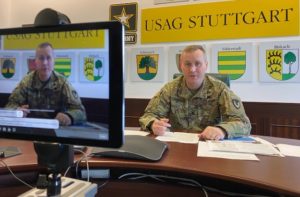By Col. Jason Condrey Commander
U.S. Army Garrison Stuttgart

By now, you may have hoped we’d be talking about coronavirus in the past tense – that you wouldn’t have to hear me saying, “every day is COVID-day, until it’s not.”
Unfortunately, that’s not the case.
Though COVID-19 is not what we would characterize as our “mission,” and we have successfully set the terms with how we will deal with coronavirus, it remains a distinct part of our environment. It drives what and how we do things, each and every day. That said, we continue to find ways where the virus doesn’t prevent us from doing the things we need or want to do.
Our work, and the things we do within our workplaces, must continue. Our missions have not stopped. The purpose for us being here in Germany, and the jobs we are doing, are vital to our nation. That’s why we, here in Stuttgart, never closed. We reduced to our essential requirements and endured.
Some things we now know for sure. We have people who are sick who don’t know they are sick. Many of our recent positive cases were people showing no signs or symptoms. We have been importing the virus from other locations. Travel, either to or from Stuttgart, official or leisure, can put our community at risk. But travel isn’t the only source of infection. Just doing things, right here in our community, can also spread the virus.
Consider this. The phone rings. A member of the contact trace team tells you that coronavirus found its way into your workplace and you have to quarantine for 14 days. Over the past month or so, people in our community have faced this reality. September was National Preparedness Month – are you and your family ready for that call?
One little slip is all it takes to have a service shut down. A last-minute stop to the commissary or post office – yes, people are doing that – puts our community at risk. Friends, co-workers and our volunteer shoppers are a crucial part of how isolation can be manageable. It comes down to individual responsibility, organizational responsibility and community responsibility.
Positive COVID-19 tests have already impacted our vehicle registration office, our base maintenance and service provider and, most recently, our childcare centers. Each instance provided an opportunity for failure, yet we persevered. Our staff took precautions and prudent steps to mitigate further spreading of the virus and protect our community. As staff tested, quarantined and, in some cases, battled illness, their colleagues found innovative ways to minimize the impacts to our services.
Outside our gates, German leaders are changing and extending local ordinances, to include locations where masks must be worn and maintaining limits on public and private gatherings. The Robert-Koch-Institute added several new places to its list of high-risk areas, to include popular destinations in France, the Netherlands and Austria. We will continue to support and follow the host nation guidelines. We must be mindful of illness. We must wear masks. We must keep our distance. We must wash our hands.
In other news, we recently welcomed more than 1,600 people to the garrison. It’s a tough time to move overseas and adjust to a new community. We found a creative way to remain connected. On Sept 12, our Army Community Service hosted a Community Activities Registration Education (C.A.R.E) Fair – 67 service providers, unit family readiness groups, school PTAs and a variety of private organizations joined us at the Exchange parking lot to share local information with hundreds of community members. Taking a step further, our team made all that information available on a Stuttgart Garrison app – a great resource for newcomers to explore what our community has to offer.
Even with COVID-19, our community has so much to offer. Before long newcomers will know why we always say, “I’m glad I Iive here.”
